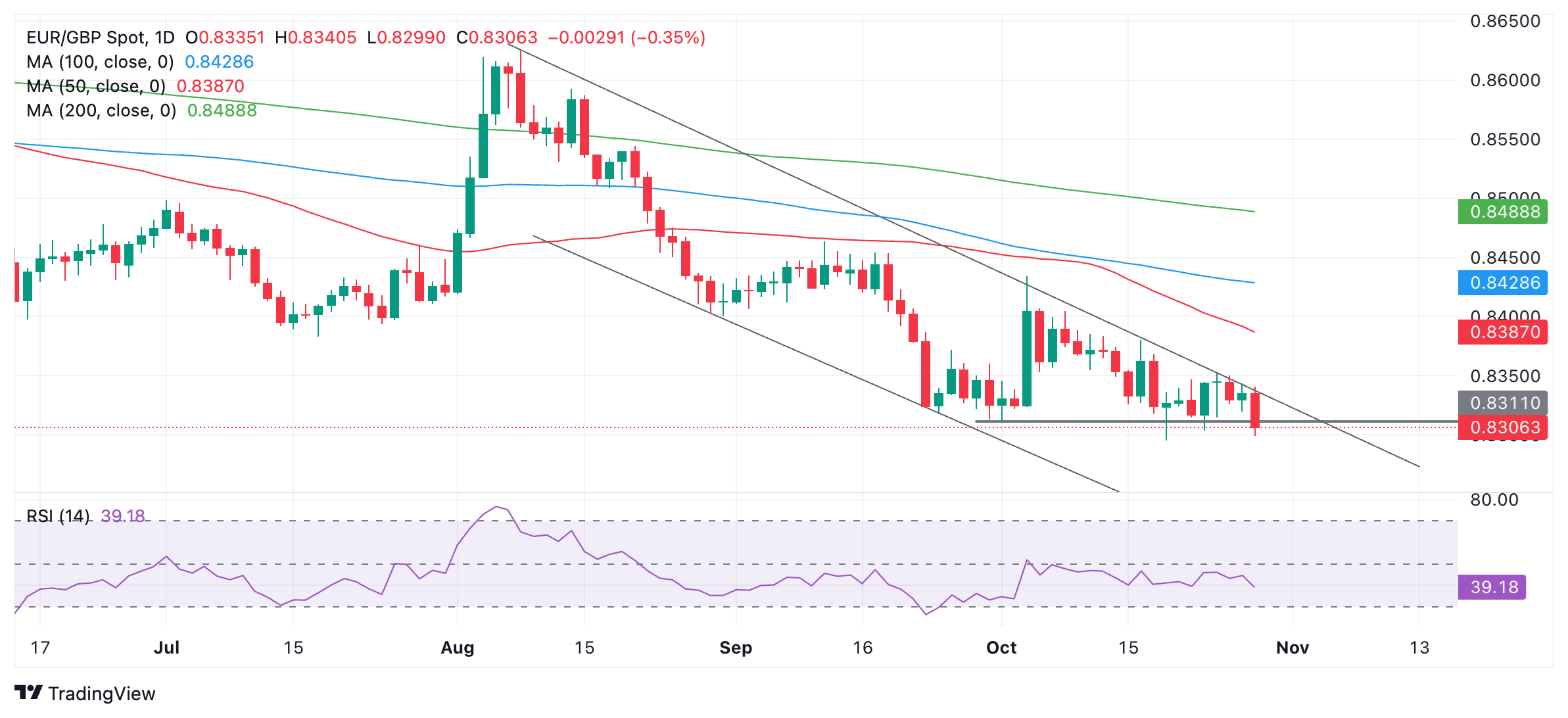- EUR/GBP weakens to near 2.5-year lows on Tuesday on divergent monetary policy expectations.
- Interest rates are expected to fall faster in Europe than in the UK, weakening the Euro against the Pound.
- Wednesday promises to be an important day for the pair with Eurozone GDP data for the third quarter and the presentation of the UK Chancellor’s Budget.
EUR/GBP is trading just above 0.8300 on Tuesday, down a quarter of a percentage point on the day and close to the two-and-a-half-year lows of 0.8295 set on October 18. A break below these lows would be a considerable bearish development.
EUR/GBP is falling as the Euro (EUR) depreciates against the British Pound (GBP) due to divergent monetary policy expectations from central banks. The European Central Bank (ECB) is expected to cut interest rates more than the Bank of England (BoE) in the remaining months of 2024 and this is putting downward pressure on the single currency – and EUR/GBP. This is because currencies with relatively lower interest rates tend to depreciate due to capital outflows.
EUR/GBP Daily Chart
Market valuation of Interest Rate Swaps provides a method to predict what central banks will do in the future, and they show “an almost 50% chance that the ECB” will reduce interest rates by 50 basis points (pb) (0.50%) in the December meeting, according to Lallalit Srijandorn, Editor at FXStreet. This compares with the UK, where a Reuters poll of economists expects the BoE to cut its bank rate by just 25bp (0.25%) on November 7. Furthermore, of those surveyed, a majority of almost two-thirds expect the BoE to leave interest rates unchanged in December.
Recent comments from ECB Governing Council members have generally emphasized the possibility of the central bank cutting rates more aggressively as inflation has declined more rapidly amid weaker-than-expected economic growth.
However, the comments softened a bit so far this week, providing some relief to the Euro on Monday. European Central Bank (ECB) Vice President Luis de Guindos said the ECB has made significant progress in reducing inflation, but cannot yet declare victory. Although he said that “domestic inflation remains high” – implying that interest rates should remain elevated – he also highlighted risks to growth, which by implication could be remedied by lowering interest rates and easing the credit.
Ahead of De Guindos, European Central Bank (ECB) policy chief Pierre Wunsch said on Monday that “it is premature to discuss the December policy decision.” He further added that he felt “no urgency in further accelerating the easing of monetary policy,” and that the decline in September inflation data could be explained by lower energy prices due to cheaper oil.
Wednesday could be a crucial day for EUR/GBP due to the release of preliminary Eurozone Gross Domestic Product (GDP) data for the third quarter, which will help clarify the growth situation in the region, and delivery of the UK Budget statement.
With the new Labor government highlighting the £22 billion black hole in the nation’s accounts left by the previous Conservative government, the UK Budget is likely to incorporate a mix of higher taxes and government spending. moderate. According to Capital Economics, even with higher taxes expected, UK consumers are not reacting by tightening their belts and growth is expected to continue at a “healthy pace.” This suggests that the Pound will remain supported.
“Overall, there is little evidence that the prospect of tax increases has made households more cautious about their borrowing. While household borrowing and spending may be somewhat softer after the magnitude of the tax rises in tomorrow’s Budget, our central forecast is that the economy expanded in September and will grow by around 0.4% quarter-on-quarter in the fourth quarter,” says Paul Dales, UK Chief Economist at Capital Economics.
Meanwhile, Eurozone GDP data is expected to show an increase of 0.8% year-on-year in the third quarter, from 0.6% in the second quarter, and an increase of 0.2% quarter-on-quarter, the same than in the previous quarter. A lower result would weaken the Euro and see further losses for EUR/GBP, while a higher result would strengthen the case for a more cautious approach to reducing interest rates reflected in Monday’s comments and would see the Euro, and the EUR/GBP recover.
Source: Fx Street
I am Joshua Winder, a senior-level journalist and editor at World Stock Market. I specialize in covering news related to the stock market and economic trends. With more than 8 years of experience in this field, I have become an expert in financial reporting.








